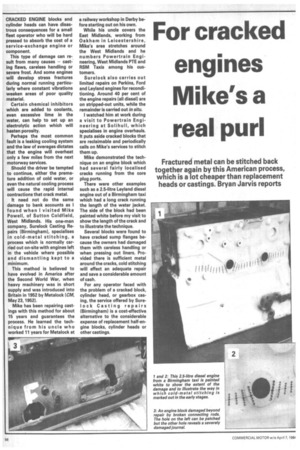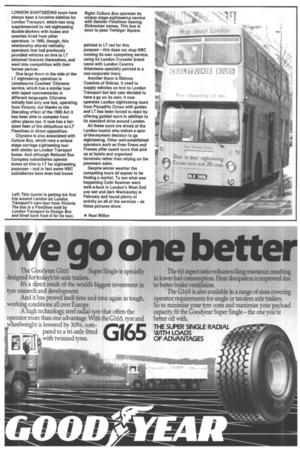For cracked engines Mike's a real purl
Page 58

Page 63

If you've noticed an error in this article please click here to report it so we can fix it.
CRACKED ENGINE blocks and cylinder heads can have disastrous consequences for a small fleet operator who will be hard pressed to absorb the cost of a service-exchange engine or cornponent.
This type of damage can result from many causes — casting flaws, careless handling or severe frost. And some engines will develop stress fractures during normal running particularly where constant vibrations weaken areas of poor quality material.
Certain chemical inhibitors which are added to coolants, even excessive lime in the water, can help to set up an electrolytic action which will hasten porosity.
Perhaps the most common fault is a leaking cooling system and the law of averages dictates that the engine will overheat only a few miles from the next motorway services.
Should the driver be tempted to continue, either the premature addition of cold water, or even the natural cooling process will cause the rapid internal contractions that crack metal.
It need not do the same damage to bank accounts as I found when I visited Mike Powell, of Sutton Coldfield, West Midlands. His one-man company, Surelock Casting Repairs (Birmingham), specialises in cold-metal stitching, a process which is normally carried out on-site with engines left in the vehicle where possible and dismantling kept to a minimum.
This method is believed to have evolved in America after the Second World War, when heavy machinery was in short supply and was introduced into Britain in 1952 by Metalock (CM, May 23, 1952).
Mike has been repairing castings with this method for about 15 years and guarantees the process. He learned the technique from his uncle who worked 11 years for Meta lock at a railway workshop in Derby before starting out on his own.
While his uncle covers the East Midlands, working from Oakham in Leicestershire, Mike's area stretches around the West Midlands and he numbers Powertrain Engineering, West Midlands PTE and RSM Taxis among his customers.
Surelock also carries out limited repairs on Perkins, Ford and Leyland engines for reconditioning. Around 40 per cent of the engine repairs (all diesel) are on stripped-out units, while the remainder is carried out in situ.
I watched him at work during a visit to Powertrain Engineering at Solihull, which specialises in engine overhauls. It puts aside cracked blocks that are reclaimable and periodically calls on Mike's services to stitch them up.
Mike demonstrated the technique on an engine block which had several fairly localised cracks running from the core plug ports.
There were other examples such as a 2.5-litre Leyland diesel engine out of a Birmingham taxi which had a long crack running the length of the water jacket. The side of the block had been painted white before my visit to show the length of the crack and to illustrate the technique.
Several blocks were found to have cracked sump flanges because the owners had damaged them with careless handling or when pressing out liners. Provided there is sufficient metal around the cracks, cold stitching will effect an adequate repair and save a considerable amount of cash.
For any operator faced with the problem of a cracked block, cylinder head, or gearbox casing, the service offered by Surelock Casting repairs (Birmingham) is a cost-effective alternative to the considerable expense of replacement half-engine blocks, cylinder heads or other castings.
LONDON SIGHTSEEING tours have always been a lucrative sideline for London Transport, which has long supplemented its red sightseeing double-deckers with buses and coaches hired from other operators. in 1980, though, this relationship altered radically: operators that had previously provided vehicles on hire to LT obtained licences themselves, and went into competition with their former partner.
One large thorn in the side of the LT sightseeing operation is Limebourne Coaches' Cityrama service, which has a similar tour with taped commentaries in different languages. Cityrama initially had only one bus, operating from Victoria, but thanks to the liberating effect of the 1980 Act it has been able to compete from other places too. It now has a fairsized fleet of the ubiquitous ex-LT Fleetlines in direct opposition.
Cityrama is also associated with Culture Bus, which runs a unique stage carriage sightseeing tour with similar ex.London Transport buses. And although National Bus Company subsidiaries operate buses on hire to LT for sightseeing purposes — and in fact some NBC subsidiaries have even had buses Right: Culture Bus operates its unique stage-sightseeing service with Daimler Fleet lines bearing Dickensian names. This bus is soon to pass Trafalgar Square.
painted in IT red for this purpose — this does not stop NBC running its own competing service, using its London Crusader brand name with London Country Atlanteans specially painted in a non-corporate livery.
Another thorn is Ebdons Coaches of Sidcup. It used to supply vehicles on hire to London Transport but last year decided to have a go on its own. it now operates London sightseeing tours from Piccadilly Circus with guides and LT has been forced to react by offering guided tours in addition to its standard drive around London.
All these tours are aimed at the London tourist who makes a spurof-the-moment decision to go sightseeing. Other well-established operators such as Evan Evans and Frames offer coach tours that pick up at hotels and organised terminals rather than relying on the pavement sales.
Despite winter weather the competing tours all appear to be finding a market. To see what was happening Colin Sowman went walk-a-bout in London's West End one wet and dark Wednesday in February and found plenty of activity on all of the services — as these pictures show.




































































































